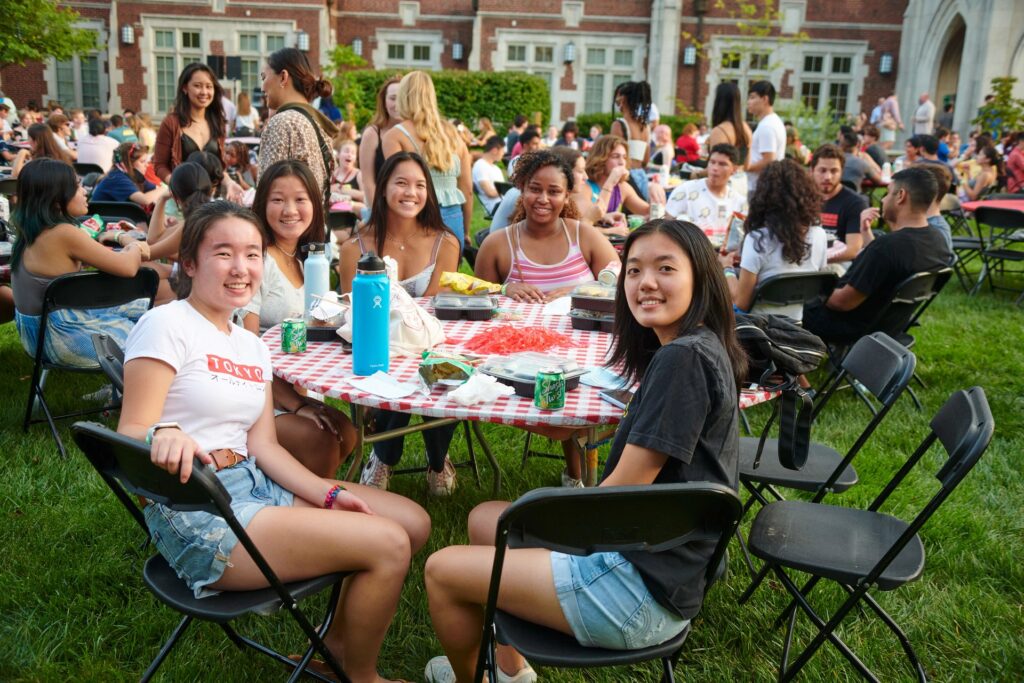Make the most of your time – while enjoying the journey.
It is never too early to begin preparing for college. Your high school years are filled with opportunities, and the choices you make will shape your future.
If you are able, challenge yourself with advanced or honors courses (if offered), explore electives, volunteer, get a job, join a club, play a sport or an instrument.
Chart your course.
A guide for preparing for WashU (or any college!) while in high school.
The starting line.
During your 9th grade year, there are several things you can do to prepare for the college admission process.
- Document your successes by collecting samples of excellent school work, copies of report cards, special awards, letters of recommendation, etc.
- Think about your future plans — what do you want to do after high school?
- Look into summer academic programs that might be of interest to you.
- Create an email address, or use the one provided to you by your high school. Use this address for your college search correspondence — remember to check it often to learn about special events and opportunities.
Keep up the momentum.
During your 10th grade year, there are several things you can continue to do to prepare for the college admission process.
- Meet with your school counselor to discuss a list of colleges and academic programs you’d like to explore, and discuss fit, next steps, etc.
- Go online to look at each school’s resources, request more information, and follow them on social media. You’ll begin receiving texts, emails, and letters from your favorite schools. Read these — they’re packed with good information.
- Prepare for standardized testing — the ACT, SAT, Advanced Placement (AP), or International Baccalaureate (IB) exams. When will you take them? What do you need to do to prepare? Does your school offer the Pre-ACT/PSAT?
- Attend college fairs or college nights at your school.
Get focused.
During 9th and 10th grades, you’ve laid the groundwork for your college application by focusing on your grades and involvement. In your junior year, it’s time to start thinking more specifically about your college plans.
- Explore your top schools and refine your list. Decide what you want out of a college and explore what each has to offer in terms of academics, faculty, research, student life, academic and career advising, and support.
- Begin thinking about who you might ask to write letters of recommendation in the fall of your senior year.
- Take the Duolingo English Test, IELTS, or TOEFL if English is not your first language.
- Visit colleges during spring/summer break. Check out each school’s website for information about visit opportunities and how to schedule.
The home stretch.
In senior year, it’s time to reap the benefits of preparing to apply to college.
- Finalize your top schools:
- Be sure to have publications and financial aid and scholarship information from each. Each school will be able to provide information about financing your education.
- Understand the application requirements including deadlines, decision plans, fees, test scores, teacher recommendations, transcripts, and essays.
- Reach out to each school if you have questions. If possible, learn who your admissions representative is and introduce yourself virtually or in person.
- Visit if you haven’t already and if you are able, or see if they have a virtual tour online.
- Apply! Start applications well before the deadline. Give yourself and others plenty of time to complete the process: write essays, gather supplemental materials, ask teachers to write recommendations, research and apply for financial aid and scholarships.
- Keep an eye out for admission decisions based on each school’s deadlines and the decision plan you selected.
- Plan for your first year at college! Learn more about orientation, summer academic programs, or other information that will help you transition to the lucky college you choose.
Good advice for any time.
- Set goals for the year.
- Maintain good attendance, grades, and citizenship.
- Develop and hone your time management skills. Commit to at least one extracurricular activity or job each year (and begin a savings account if you work for pay).
- Connect with your school counselor early and often about your plans for the future, top colleges, and classes you want to take.
- Keep track of your activities and accomplishments.
- Take time to discover who you are and what you want in life.

Make the most of your summer!
Our summer programs offer highly motivated students the opportunity to experience WashU in the classroom and beyond, including specialized programs for rural scholars and St. Louis high school students.
